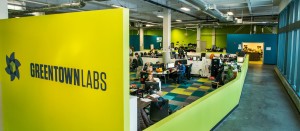While experts have regularly acknowledged the decline of the manufacturing industry in America, they have done very little to reverse it. An innovative, new-business incubator in Somerville, MA is starting to take steps in a better direction.
Greentown Labs—A Manufacturing and Technology Incubator
Greentown Labs assists other startups in the technology and manufacturing fields. Like many business incubators, it incorporates a cooperative working space for startups. However, unlike the others, Greentown also offers prototype-manufacturing space, shared machinery and shop tools, and a large event space. In total, the lab offers 33,000 total square feet of creative space for their companies. Manufacturing startups at Greentown are provided with the necessary infrastructure to move their company from conceptual stages to actual production- and revenue-making stages.
Greentown Labs currently hosts 40 companies and supporting organizations that employ over 300 people. Not surprisingly, many of Greentown’s companies specialize in clean technology and the energy industry. The lab also boasts an impressive list of energy-conscious alumni that have “graduated” into their own spaces.

Not only do Greentown companies have a versatile physical space to use, they also utilize the services of “sponsor companies” to assist their operations. For example, members are granted access to sponsor-supplied software at little to no cost to their company. Additionally, members have access to marketing, human resources, graphic design, insurance, and other services. Companies working in the incubator also have the all-important opportunity to network and collaborate with other startups.
Bringing Manufacturing Innovation Back to the Bay State
Incubators such as Greentown Labs make it easier for startups to bring manufacturing job opportunities back to Massachusetts. Over the past several years, Boston has quickly emerged as one of the country’s leading technological hubs. While major research universities such as MIT and Harvard play a role, a business incubator devoted to manufacturing provides a unique, invaluable advantage to the Boston area.
Massachusetts Business Incubator Is Popular Among Politicians
The incubator philosophy has not gone unnoticed by local business and government leaders. During a recent visit to the Greentown Labs, Massachusetts Senator Elizabeth Warren said they were “the best of what America has to offer.” She said that it is crucial to “level the playing field” between startup initiatives and technology giants; this will help prevent the behemoths from dominating the industry. As Greentown Labs continues to nurture these successful startups, we look forward to their growth and the positive impact they will have on our economy.










